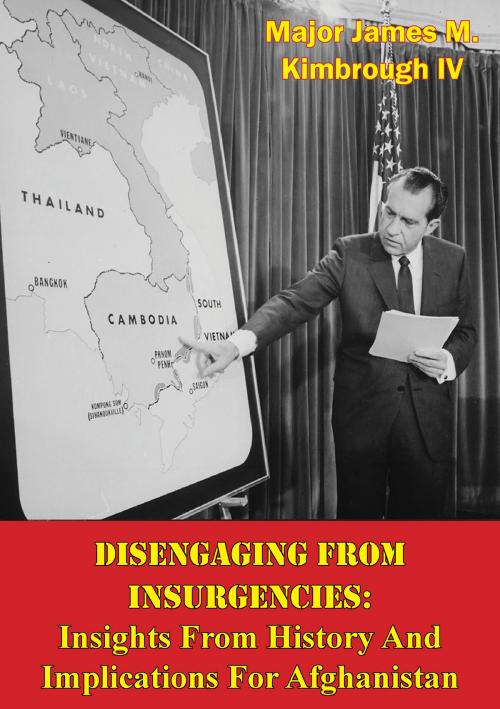Disengaging From Insurgencies: Insights From History And Implications For Afghanistan
Nonfiction, History, Middle East, Persian Gulf War, Military| Author: | Major James M. Kimbrough IV | ISBN: | 9781786253453 |
| Publisher: | Tannenberg Publishing | Publication: | November 6, 2015 |
| Imprint: | Tannenberg Publishing | Language: | English |
| Author: | Major James M. Kimbrough IV |
| ISBN: | 9781786253453 |
| Publisher: | Tannenberg Publishing |
| Publication: | November 6, 2015 |
| Imprint: | Tannenberg Publishing |
| Language: | English |
To determine insights for future disengagements, this thesis examines four historical episodes in which Western nations withdrew from on-going conflicts against insurgent-like enemies.
Relatively unsuccessful results flowed from the British withdrawal from Aden during the 1960’s and the American withdrawal from Vietnam during 1972-1973. As the last British troop departed Aden, a state of turmoil prevailed. Not only could the insurgents realistically claim victory in evicting the British by force, but also the territory later became the Arab world’s first Marxist state and a base for terrorists. America’s departure from Vietnam produced similar disappointment.
More successful outcomes occurred during the British withdrawal from Malaya in the 1960’s and the American withdrawal from El Salvador in 1988-1989. After World War II, the British attempted to re-establish colonial control of Malaya and faced resistance from communist insurgents. In the midst of their counterinsurgency, the British government granted Malaya independence in August 1957. The Malayan government, backed by British support, continued its struggle against the communist insurgents for another three years. The Malayan government announced victory in 1960 and began to enjoy a relatively peaceful and prosperous aftermath. From kidnappings, assassinations, and other political-criminal activities, an insurgency emerged in El Salvador in 1979. As the movement transitioned to guerrilla warfare, the insurgent fighters rivaled the strength of the Salvadoran security forces. From 1980-1992, the government of the United States provided El Salvador extensive funding for social and political reforms, military material support, and training to counter the communist insurgents. These efforts, coupled with effective El Salvadoran governance, eventually led the communists to abandon their cause.
To determine insights for future disengagements, this thesis examines four historical episodes in which Western nations withdrew from on-going conflicts against insurgent-like enemies.
Relatively unsuccessful results flowed from the British withdrawal from Aden during the 1960’s and the American withdrawal from Vietnam during 1972-1973. As the last British troop departed Aden, a state of turmoil prevailed. Not only could the insurgents realistically claim victory in evicting the British by force, but also the territory later became the Arab world’s first Marxist state and a base for terrorists. America’s departure from Vietnam produced similar disappointment.
More successful outcomes occurred during the British withdrawal from Malaya in the 1960’s and the American withdrawal from El Salvador in 1988-1989. After World War II, the British attempted to re-establish colonial control of Malaya and faced resistance from communist insurgents. In the midst of their counterinsurgency, the British government granted Malaya independence in August 1957. The Malayan government, backed by British support, continued its struggle against the communist insurgents for another three years. The Malayan government announced victory in 1960 and began to enjoy a relatively peaceful and prosperous aftermath. From kidnappings, assassinations, and other political-criminal activities, an insurgency emerged in El Salvador in 1979. As the movement transitioned to guerrilla warfare, the insurgent fighters rivaled the strength of the Salvadoran security forces. From 1980-1992, the government of the United States provided El Salvador extensive funding for social and political reforms, military material support, and training to counter the communist insurgents. These efforts, coupled with effective El Salvadoran governance, eventually led the communists to abandon their cause.


![Cover of the book Great Commanders [Illustrated Edition] by Major James M. Kimbrough IV](https://www.kuoky.com/images/2014/august/300x300/9781782894469-7Bt4_300x.jpg)


![Cover of the book Leaping The Atlantic Wall - Army Air Forces Campaigns In Western Europe, 1942-1945 [Illustrated Edition] by Major James M. Kimbrough IV](https://www.kuoky.com/images/2015/november/300x300/9781786252456-4Yqi_300x.jpg)
![Cover of the book American Airpower Comes Of Age—General Henry H. “Hap” Arnold’s World War II Diaries Vol. II [Illustrated Edition] by Major James M. Kimbrough IV](https://www.kuoky.com/images/2015/november/300x300/9781786251527-cvaI_300x.jpg)





![Cover of the book First In The Air: The Eagle Squadrons Of World War II [Illustrated Edition] by Major James M. Kimbrough IV](https://www.kuoky.com/images/2014/august/300x300/9781782898788-X7SX_300x.jpg)


![Cover of the book Thunderbolt!: The Extraordinary Story Of A World War II Ace [Illustrated Edition] by Major James M. Kimbrough IV](https://www.kuoky.com/images/2015/november/300x300/9781786251817-P2gc_300x.jpg)